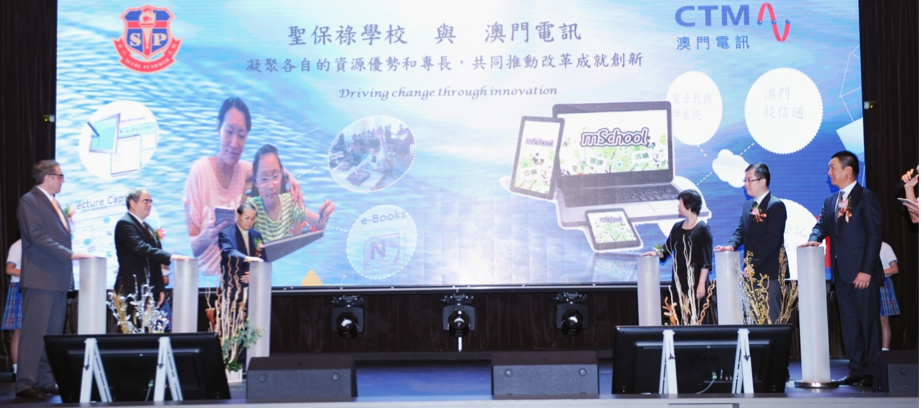
LAUNCHING OF MSCHOOL AND SIGNING CEREMONY OF COLLABORATION PLEDGE BETWEEN SAINT PAUL SCHOOL AND CTM
On 25 September, Saint Paul school held a dual celebration to mark another milestone in the School’s development – the launching of the MSchool and the ‘Signing Ceremony of Collaboration Pledge between Saint Paul School and CTM (Companhia de Telecomunicações de Macau)’ on synergising resources to advance ICT in education in Macau.
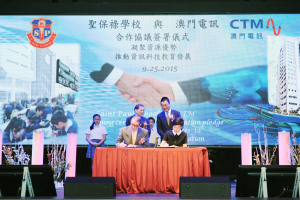
The Clementina’s School Hall was to its full capacity with representatives from the Government, Principals/representatives from Macau Schools, Directors from the different departments of CTM, friends of the school, parents, students and teachers. After a short prayer and a blessing form Bishop Don Jose Lai, the audience witnessed, in a very high professional way, the launching of the ‘Mschool’, ceremony which was presided by the Most Rev. Bishop of Macau, Don Jose Lai; the Provincial of the Holy Rosary Province, Fr. Javier Gonzalez; the Head of Department from the Education and Youth Affairs, Ms. Leong Vai Kei; the Head of Department from the Bureau of Telecommunication Regulation Bureau, Mr. Francisco Leong; the CEO of CTM Mr. Vandy Poon and the Principal of Saint Paul school Fr. Alejandro Salcedo and the ‘Signing Collaboration Pledge’ led by Ms. Ebel Chan as representative from CTM and Fr. Alejandro Salcedo as representative of the School and with Bishop Don Jose Lai and Mr. Vandy Poon as witnesses of the signing collaboration pledge.
This is another mile stone and a further step forward to Saint Paul School serious commitment and contribution to education and the immersion of IT into the classrooms “This project not only applies information technology to boost teaching at school, but it also enhances the intelligence of information technology, starting from its very original learning platform, making it a modernised bridge of communication between school and parents… Today is a joyful day for we gather here to witness Saint Paul School working with local enterprise to launch the “Synergising resources to advance ICT in Education program†remarked in her speech the Head of Department of the DSEJ, Ms. Leong.
To the question why the cooperation with CTM in this project, the Principal remarked that the School openness of cooperation with other agencies is very clearly stated in the School Policies since no school can be considered, as the saying goes, one-man-band. The Mschool app is the answer to the School need of creating a single CMS (Communication Management System) for a more effective communication between school and parents and to create a stronger school-home partnership.
The launching ceremony of the mobile phone application of the St. Paul School today craves the landmark of cooperation and communication between school and parents. It also proves how serious the school considers and how actively participates in the cooperation between the school and parents. Being the first project of its kind here in Macau, Saint Paul School has once again shown its commitment to a student-centered approach to teaching and its vow to work with parents in the development of their children.
After the signing ceremony and the different speeches from the School, CTM, DSEJ and the parents the audience was entertained, in the highest professional way, with a modern dance, by the School dance team, a piano performance by a 4 year old student and one of our alumnae and a ballad about peace by one of our students. The performers showed not only their talent, but also the spontaneity and enjoyment while performing. After the ceremony in the School hall the audience was invited to the Fra Angelico Exhibition Gallery for some refreshments.
Once again, congratulation to Saint Paul School and may Saint Paul and Saint Dominic continue blessing them.

On March 5-7, 2015 the Pontifical Academy for Life (PAV) celebrated its XXI General Assembly at the Vatican. One hundred and twenty five members from all over the world attended and participated in the PAV meeting and public conference. The theme was “Assisting the Elderly and Palliative Care.â€
The General Assembly was opened in the morning of March 5 by the President of the Pontifical Academy for Life the Most Reverend Archbishop Ignacio Carrasco de Paula, DD. The inaugural session started with the praying of the Pater Noster (Our Father). Thereafter, bishop Carrasco spoke briefly of the current work being done by PAV and of the work to be done in the near future. The work of the Pontifical Academy is deep research on bioethical issues as viewed from reason and Christian faith.
The inaugural session was followed by the audience with Pope Francis at noon time at the Sala Clementina in the Vatican. The Holy Father spoke to the PAV assembly of the serious obligation of all to respect the elderly, our brothers and sisters. Pope Francis grounded this due respect, particularly by sons and daughters, in the biblical teachings centered on the fourth commandment “Honor your father and mother†(Ex 20:12; Dt 5:16). The Pope said that “abandonment of the elderly is the gravest sickness of the elderly.†After his address, the Holy Father greeted personally each member of the Academy and gave a Rosary to everyone.
In the afternoon of March 5, the PAV members were organized into seven working groups according to language: 3 groups for the English speaking, two for the Spanish, one for the Italian and one for the French. Some weeks earlier, all the members had received from the PAV administration in Rome a paper entitled “talking points†that would guide the discussion by the seven groups. These guidelines for discussion centered on the following points: nature of palliative care and palliative care for the elderly, palliative care and dementia, palliative care and euthanasia, end of life decision-making, artificial nutrition and hydration, and spiritual and pastoral care. The output of the group discussions will be published later on in the Book of Proceedings of the 2015 Assembly/Conference. A synthesis of the output from each group will be presented on the last day of the meeting March 7.
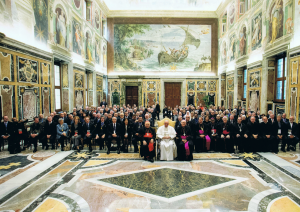
Palliative care is a very significant topic today. It has even become a specialty of medicine. Palliative care is an approach to improving the authentic quality of life of patients at the end of life or with incurable diseases. It focuses on pain relief and loving accompaniment or “a warm heart†up to death, which should come at the proper time: neither earlier (through euthanasia) nor later (through the abuse of futile or too burdensome extraordinary means of treatment). Today, palliative care is usually to all patients, also when cure is possible.
For the sessions for March 6, PAV had organized a conference opened to the general public on the theme of the XXI PAV General Assembly namely “Assisting the Elderly and palliative Care.†In three sessions on clinical care, sociological and ethical-theological perspectives different sub-topics were presented by experts on the matter. Among the concrete topics discussed were the following:  the elderly at the end of life due to chronic degenerative illnesses, nursing care for the terminally ill elderly, use and abuse of analgesics in palliative care, the central role of ‘relationships’ (the elderly, healthcare workers, family and society); beyond verbal communication; ethical guidelines for good ‘accompaniment’; social solidarity; care of the elderly with dementia, and spiritual and pastoral care at the end of life. In all, fifteen speakers presented their concrete sub-topic in twenty five minutes each. There were two open fora where the participants questioned the speakers. Over three hundred people, beside the members of the Pontifical Academy for Life attended the whole day conference, which was really enriching and fruitful.
March 7, the last day of the XXI PAV General Assembly was attended by its members only. The day started with a simple Mass before the tomb of St. John Paul II at St. Peter’s Basilica. The Eucharistic celebration was presided by PAV’s President and concelebrated by five more bishops and twenty priests – all members of PAV. About a hundred more faithful and some sisters – all members of PAV – participated in the Holy Mass. In the short homily, Bishop Carrasco spoke of the gratitude of the Academy to St. John Paul II, who founded PAV in 1994, and issued the pace-setting encyclical on life Evanglium Vitae, or The Gospel of (we are celebrating this year its twentieth anniversary). Pope John Paul II was an indefatigable defender and promoter of human life from the moment of conception to natural death. We all prayed to him and ask the saintly Pope for continuing strength in our resolve to go on courageously and compassionately promoting the gift and grace of life.
In the final session, we listened to the synthesis reports of the seven working groups. Some important ideas were repeated: we are not masters of our death; “any attack on life is an attack on the familyâ€; authentic quality of care for all, especially for the terminally ill elderly; palliative care for all patients, even when cure is possible; dignity and rights of every person – right to life and right to freedom; the elderly are equal to other groups regarding life, health, suffering and death; suffering is not pointless and for Christians and others it can become redemptive suffering; hospice care is a good method of palliative care for the terminally ill; problems of loneliness and fragmentation of the family; no discrimination against the elderly (all human life is valuable and vulnerable); importance of the spiritual dimension of life – of the virtue of hope.
Before closing 2015 PAV General Assembly, some members presented brief individual communications on congresses held or to be held, books published or to be published soon. The PAV President closed the XXI General Assembly with words of gratitude and hope – and a prayer. It was indeed a very successful assembly/conference. It was rich in content and richer in fraternal interaction and exchanges.
The Pontifical Academy for Life is the Holy See’s scientific think-tank for bioethics. Its aim is “the defense and promotion of the value of human life and the dignity of the person†(PAV Statutes). St. John Paul II explains: “I established the Pontifical Academy for Life, assigning it the task of studying and providing information and training about the principal problems of law and biomedicine pertaining to the promotion of life, especially in the direct relationship they have with Christian morality and the directives of the Church’s Magisterium†(Evangelium Vitae, n. 96).
- Fausto Gómez Berlana, OP
Rome, March 2015

On March 18, 2015, the University of Saint Joseph, the Catholic University of Macau celebrated its patron saint, St. Joseph, with a solemn Mass at the chapel of the Seminario of St. Joseph at 12:30 in the afternoon.
The Mass was presided by the Bishop of Macau, the Most Rev. Joseph Lai, DD, and concelebrated by eleven priests from the diocesan clergy and different religious congregations, including the Dominican Order. Fr. Peter Stilwell, the Rector of the University of Saint Joseph was among the concelebrating priests. The Eucharistic celebration was animated by liturgical songs rendered well by the students of the Faculty of Religious Studies of the University of Saint Joseph, including our twenty student brothers. The Holy Mass was attended by the professors and students of the Faculty of Religious Studies and some other professors and students from other university faculties, and by the support staff of the university.
The Mass was followed by a simple fraternal agape generously provided by the Seminario of Saint Joseph.
In the same context, our Priory of Saint Dominic celebrated the solemnity of Saint Joseph on his day, which is March 19. In the Eucharistic celebration, the community prayed for all the brothers whose name is Joseph and, in particular, for our brothers who compose the community of St. Joseph House in Kowloon Tong, Hong Kong. Some of our brothers, moreover, went to Kowloon Tong in the afternoon to share in the dinner/agape prepared by St. Joseph House, which is also the house of the Provincial Curia.
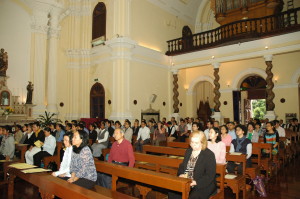

Saint Paul School “Classroom 2012 Educational Project†has secured the “Merit Award†at the Macau ICT Awards 2014. The innovative and unique “2012 classroom educational project†in Asia was born on the realization that the School’s approach to learning and teaching was not addressing the technological needs of our 21st. century students and ICT was not improving the quality of education of our students. With this in mind Saint Paul School embarked themselves in the “Classroom 2012 Educational Project†with the conviction that the complete introduction of ICT into their educational environment would increase new learning opportunities and improve students’ motivation and achievement.
After 5 years of the implementation of the program and with over 1,500 students and 100 teachers using e.tablets as the main gadget for their learning and teaching process and the encouragement from different sectors of the society and Government Departments, Saint Paul School decided to take part in the Macau ICT Award competition aiming to benchmark opportunities to ICT innovators, academics and entrepreneurs in the region.
The news of the “Classroom 2012 Educational Project†being granted the “Merit Award†was received by the School Community with great joy and enthusiasm, as this award not only represents the sophistication and uniqueness of the project but also the recognition of the tremendous effort and dedication of all of us at Saint Paul School in reviewing our curriculum and pedagogical practices to accommodate new learning and teaching styles aiming to develop systems and structures that excite, engage and motivate our students.
As Saint Paul “Classroom 2012 Educational Project†will be representing Macau in the upcoming Asia Pacific Information and Communication Technology Awards 2014 (APICTA 2014) contest in Jakarta, Indonesia on the 27th. – 20th. November 2014, we congratulate the School and wish the team members all the success in the coming APICTA 2014

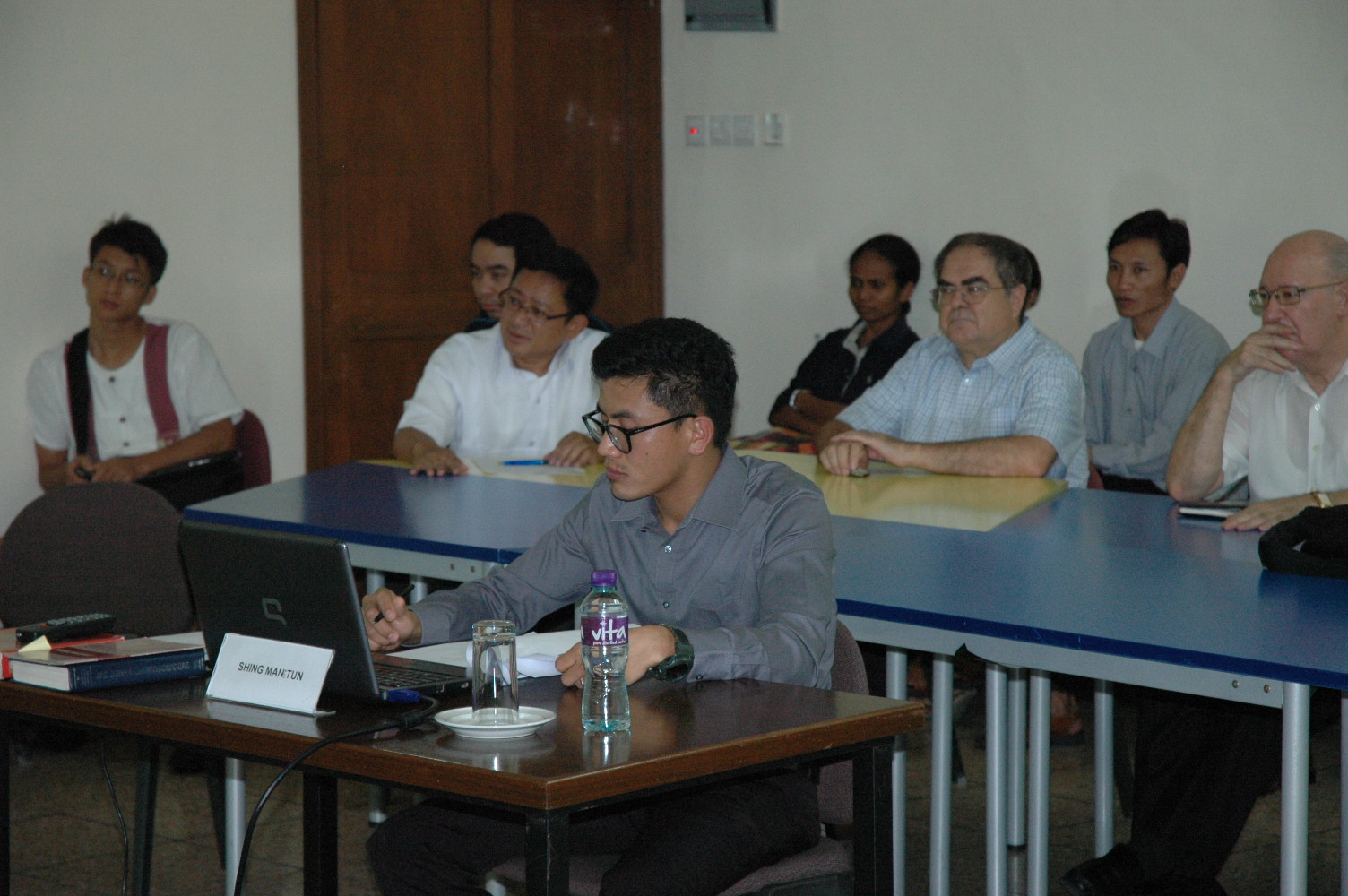
On September 15, 2014, three solemnly professed brothers presented their respective thesis for the Bachelor’s Degree in Theology (STB), thus ending their institutional studies. The academic act took place at the Seminary of Saint Joseph, Macau, in the Faculty of Religious Studies of the University of Saint Joseph.
The first to present his work was Brother Mathew Shing Mang Tun, OP, who defended his thesis entitled The Catechetical Methodology of Saint John Chrysostom in His Baptismal Instructions. His Supervisor was Professor Joao Eleuterio. The other two members of the tribunal were Professor Franz Gassner, SVD, Chairperson, and Professor Fausto Gomez, OP, examiner.
Brother Alphonso Bo Bo, OP, was the second to present his academic work. His thesis is entitled The Challenges of Being a Christian among the Buddhists in Myanmar. The Supervisor of the thesis was Professor Fausto Gomez, OP. The other two members of the tribunal: Professor Joao Eleuterio, Chairperson, and Professor Ana Chan, Examiner.
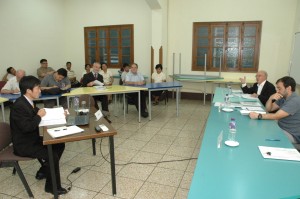
Finally, our brother Mario Oo Schwe, OP, presented his thesis entitled Redemption in St. Anselm and St. Thomas Aquinas. The Supervisor was Professor Joao Eleuterio, and the other two members of the tribunal were Professor Fausto Gomez, OP, Chairperson, and Professor Arnold Monera, Examiner.
After the required five years of philosophical and theological studies our three brothers defended their respective thesis competently and elegantly. The thesis defense was witnessed by some Dominican priests – headed by Fr. Provincial Javier Gonzalez, OP – a good number of our student brothers and some postulants of the sisters of the Congregation of Dominican Missionaries of the Rosary. The three were approved with flying colors. They will receive their well-earned diploma on September 27, 2014, on the Graduation Day of the University of Saint Joseph to be held at the Macau Cathedral.
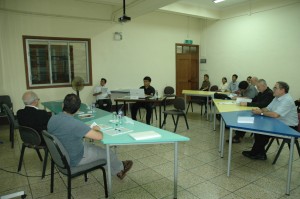
Our three brothers are leaving our St. Dominic’s Priory in a few days to prepare for their next assignment: Brother Matthew, to our community in Kowloon Tong, Hong Kong; Brother Alphonso, to one of the three Dominican communities in Myanmar, and Brother Mario to our convent in San Juan, Metro Manila.
Brothers Matthew, Alphonso and Mario, our warmest CONGRATULATIONS. Your presence enriched our life at St. Dominic’s. Thank you very much and “so longâ€. May God be with you always.

Tempus fugit – “Time fliesâ€. As we begin Academic Year 2014-2015, our Christian Studies program at the University of St. Joseph-Macau is now on its 8th year of existence. After some 40 years since formal classes in philosophy and theology were held in the historically Seminario de São Jose, the doors of the seminary opened once again in the Academic Year 2007-2009 with ten (10) students, which included Frs. Edmond Eh, Christopher Chor, Isaiah Hong Seung Kook (all Dominicans), and Reginaldus Amleni, SVD. The first Dean was the Australian Fr. Dennis Rochford, MSC, a position he held for two academic years. From Academic Year 2009-2010 onwards, Prof. João Eleuterio of the Faculty of Theology, Catholic University of Portugal took the helm as Dean for five years. In just few years of our existence as a Faculty, we have produced alumni priests working in Hong Kong, Macau, South Korea, The Philippines, Taiwan, and Myanmar. There are several alumni awaiting their ordination to the Diaconate this year. One lay alumnus is pursuing a doctorate degree in Theology, with specialization in Old Testament Studies, in Belgium.
For this new academic year, 2014-2015, under a new Dean, Prof. Arnold Monera, and a new Coordinator for the Department of Catholic Theology, Prof. Franz Gassner, SVD, the Faculty of Religious Studies has 46 students mostly coming from Myanmar, Timor Leste, Vietnam, South Korea, Indonesia, Macau, and the Philippines. All these years, we have been witnesses to changes: from IIUM to USJ, from Faculty of Christian Studies to Faculty to Religious Studies, from the Seminary Campus to NAPE Campus, and now back to the Seminary.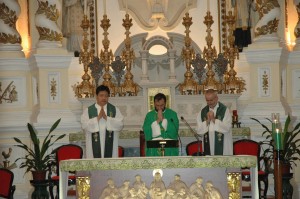
As a young Faculty, we recognize the many rooms for improvement. True to our mandate of preparing well-educated clergy, religious sisters, and lay leaders to serve the Church and society in their own countries and congregations, we envision to have a more participative, more engaging, more vibrant Faculty. The Faculty believes that good theology is the backbone of re-evangelization and the guiding principle for relevant involvement in Church life and in the larger secular society.
At the Opening Day of the Academic Year held last 10 September 2014, the Dean exhorted the students to give their best in the studies citing that there is no place for mediocrity in our Church and society. The Coordinator in his message emphasized the values the students of the Faculty should inculcate: punctuality, cooperation, time management, group studies.
Realizing that the present Pope has declared 2015 as the year dedicated to consecrated life, the Faculty invited two outstanding religious working in Macau to give inspirational words to the student assembly: Fr. Aidan Conroy of the Salesians of Don Bosco who has been working in Instituto Salesianum-Macau for 40 years; and the Religious of Good Shepherd Sr. Juliana Devoy for her tireless commitment to helping women and children in Macau. Â Â Â Â Â Â Â Â Â Â Â Â Â Â Â Â Â Â Â Â Â Â Â Â Â Â Â Â Â Â Â Â Â Â Â Â Â Â Â Â Â Â Â Â Â Â Â Â Â Â 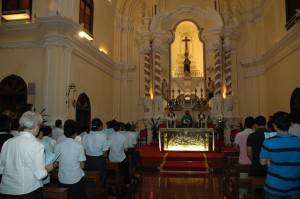
The Eurcharistic Celebration was presided by Fr. João Eleuterio, with Fr. Franz Gassner and Fr. Edmond Eh concelebrating. The Dominican sisters rendered melodious songs during the Mass.
The Grand Opening Celebration ended with potluck lunch with every community bringing food that was shared to all. At the end, the students still gathered several baskets of left-overs from the sharing of food.














